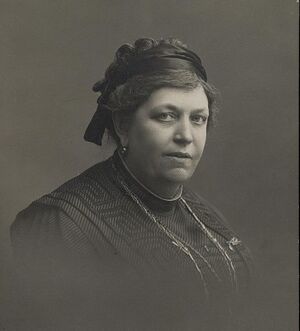Mysłowice and Varvara Zarudnaya: Difference between pages
m (1 revision imported) |
|||
| Line 1: | Line 1: | ||
{{picture|file=Varvara Zarudnaya.jpg|caption='''Varvara Zarudnaya''' (1857-1939)}} | |||
Ukrainian opera artist (soprano) and teacher (b. 5/17 December 1857 in Yekaterinoslav [now Dnepropetrovsk, Ukraine]; d. 14 March 1939 in [[Moscow]]), born '''''Varvara Mikhaylovna Zarudnaya''''' (Варвара Михайловна Зарудная); sometimes known after her marriage as '''''Varvara Mikhaylovna Zarudnaya-Ivanova''''' (Варвара Михайловна Зарудная-Иванова). | |||
==Tchaikovsky and Varvara Zarudnaya== | |||
The wife of the composer [[Mikhail Ippolitov-Ivanov]] (1859–1935), whom she married in 1883, Varvara was an artist with the [[Kiev]] (1882–83) and [[Tiflis]] (1883–93) opera companies, and a professor at the [[Moscow]] Conservatory from 1893 to 1924. Tchaikovsky highly valued her singing talents, and attempted to persuade her to perform at the Imperial Theatres in [[Moscow]] or [[Saint Petersburg]]. Tchaikovsky was also very fond of the Ippolit-Ivanovs' adoptive daughter Tanya (whom he would affectionately call "Shishechka", i.e. "little fir cone"), who was about two years old at the time of the composer's last visit to [[Tiflis]] in 1890. As the mezzo-soprano Aleksandra Amfiteatrova-Levitskaya (1858-1947) explains in her memoirs, Tchaikovsky's affection for Tanya owed a lot to the following circumstances: the little girl was a foundling whom Varvara Mikhaylovna had discovered in a basket left on the doorstep of her house one night after returning from a performance of ''[[Yevgeny Onegin]]'' at the [[Tiflis]] opera-theatre. She and her husband, who had no children of their own, decided to adopt her and christened her after the heroine of Tchaikovsky's opera, sung to great acclaim by Zarudnaya earlier that day <ref name="note1"/>. | |||
==Correspondence with Tchaikovsky== | |||
8 letters from Tchaikovsky to Varvara Zarudnaya have survived, dating from 1888 to 1891, of which those highlighted in bold have been translated into English on this website: | |||
* '''[[Letter 3509]]''' – 1/13 March 1888, from [[Paris]] | |||
* [[Letter 3571]] – 18/30 May 1888, from [[Frolovskoye]] | |||
* [[Letter 3595]] – 17/29 June 1888, from [[Frolovskoye]] (addressed to Varvara and her husband [[Mikhail Ippolitov-Ivanov]]) | |||
* [[Letter 3612]] – 12/24 July 1888, from [[Frolovskoye]] (addressed to Varvara and her husband [[Mikhail Ippolitov-Ivanov]]) | |||
* [[Letter 3929]] – 8/20 September 1889, from [[Frolovskoye]] | |||
* [[Letter 4179]] – 20 July/1 August 1890, from [[Frolovskoye]] | |||
* [[Letter 4412]] – 17/29 June 1891, from [[Maydanovo]] | |||
* [[Letter 4421]] – 25 June/7 July 1891, from [[Maydanovo]] (addressed to Varvara and her husband [[Mikhail Ippolitov-Ivanov]]) | |||
9 letters from Varvara Zarudnaya to Tchaikovsky, dating from 1888 to 1891, are preserved in the {{RUS-KLč}} at [[Klin]] (a{{sup|4}}, Nos. 1218–1226). | |||
==Bibliography== | |||
* {{bib|1927/28}} (1927) | |||
* {{bib|1947/31}} (1947) | |||
* {{bib|1986/54}} (1986) | |||
==External Links== | |||
* [[wikipedia:uk:Зарудна_Варвара_Михайлівна|Wikipedia]] (Ukrainian) | |||
* {{viaf|3535881}} | |||
==Notes and References== | |||
<references> | |||
<ref name="note1">The memoirs of Aleksandra Amfiteatrova-Levitskaya about Tchaikovsky's visits to [[Tiflis]] are included in {{bib|1980/24|Воспоминания о П. И. Чайковском}} (1980), p. 242.</ref> | |||
</references> | |||
[[Category:People|Zarudnaya, Varvara]] | |||
[[Category:Correspondents|Zarudnaya, Varvara]] | |||
[[Category:Singers|Zarudnaya, Varvara]] | |||
__NOTOC__ | |||
Latest revision as of 15:25, 11 April 2024
Ukrainian opera artist (soprano) and teacher (b. 5/17 December 1857 in Yekaterinoslav [now Dnepropetrovsk, Ukraine]; d. 14 March 1939 in Moscow), born Varvara Mikhaylovna Zarudnaya (Варвара Михайловна Зарудная); sometimes known after her marriage as Varvara Mikhaylovna Zarudnaya-Ivanova (Варвара Михайловна Зарудная-Иванова).
Tchaikovsky and Varvara Zarudnaya
The wife of the composer Mikhail Ippolitov-Ivanov (1859–1935), whom she married in 1883, Varvara was an artist with the Kiev (1882–83) and Tiflis (1883–93) opera companies, and a professor at the Moscow Conservatory from 1893 to 1924. Tchaikovsky highly valued her singing talents, and attempted to persuade her to perform at the Imperial Theatres in Moscow or Saint Petersburg. Tchaikovsky was also very fond of the Ippolit-Ivanovs' adoptive daughter Tanya (whom he would affectionately call "Shishechka", i.e. "little fir cone"), who was about two years old at the time of the composer's last visit to Tiflis in 1890. As the mezzo-soprano Aleksandra Amfiteatrova-Levitskaya (1858-1947) explains in her memoirs, Tchaikovsky's affection for Tanya owed a lot to the following circumstances: the little girl was a foundling whom Varvara Mikhaylovna had discovered in a basket left on the doorstep of her house one night after returning from a performance of Yevgeny Onegin at the Tiflis opera-theatre. She and her husband, who had no children of their own, decided to adopt her and christened her after the heroine of Tchaikovsky's opera, sung to great acclaim by Zarudnaya earlier that day [1].
Correspondence with Tchaikovsky
8 letters from Tchaikovsky to Varvara Zarudnaya have survived, dating from 1888 to 1891, of which those highlighted in bold have been translated into English on this website:
- Letter 3509 – 1/13 March 1888, from Paris
- Letter 3571 – 18/30 May 1888, from Frolovskoye
- Letter 3595 – 17/29 June 1888, from Frolovskoye (addressed to Varvara and her husband Mikhail Ippolitov-Ivanov)
- Letter 3612 – 12/24 July 1888, from Frolovskoye (addressed to Varvara and her husband Mikhail Ippolitov-Ivanov)
- Letter 3929 – 8/20 September 1889, from Frolovskoye
- Letter 4179 – 20 July/1 August 1890, from Frolovskoye
- Letter 4412 – 17/29 June 1891, from Maydanovo
- Letter 4421 – 25 June/7 July 1891, from Maydanovo (addressed to Varvara and her husband Mikhail Ippolitov-Ivanov)
9 letters from Varvara Zarudnaya to Tchaikovsky, dating from 1888 to 1891, are preserved in the Tchaikovsky State Memorial Musical Museum-Reserve at Klin (a4, Nos. 1218–1226).
Bibliography
- Переписка П. И. Чайковского с М. М. Ипполитовым-Ивановым и его женой В. М. Зарудной-Ивановой (1885-1893) (1927)
- Переписка М. М. Ипполитова-Иванова с П. И. Чайковским (1885-1893) (1947)
- Переписка М. М. Ипполитова-Иванова с П. И. Чайковским (1885-1893) (1986)
External Links
Notes and References
- ↑ The memoirs of Aleksandra Amfiteatrova-Levitskaya about Tchaikovsky's visits to Tiflis are included in Воспоминания о П. И. Чайковском (1980), p. 242.

